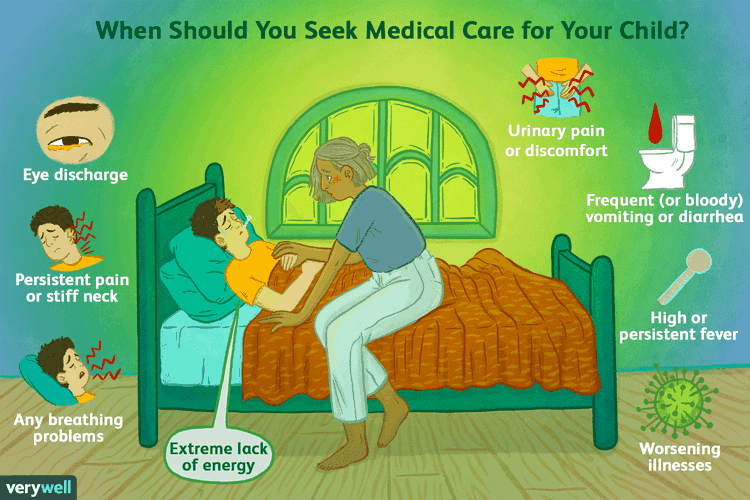When to Take Your Sick Child to a Healthcare Provider

- February 8, 2023
Especially during cold and flu season, it may be hard to determine when you should keep your sick home and when you should go see a healthcare provider or pediatrician. You should always seek professional care when concerned about your child’s health or if you have any unanswered health-related questions.
Warning Signs
A simple phone call to a nurse or an appointment with a healthcare provider can help ease your mind if something just doesn’t seem right. However, you should seek medical care if your child is experiencing:
- High or persistent fever
- Any breathing problems, such as fast, labored, or noisy breathing from the chest
- Persistent pain, such as an earache, sore throat, severe headache, or stomach ache
- Eye discharge that is thick, sticks the eyelids shut, and doesn’t get better during the day
Additionally, you may need to have your child seen for:
- Frequent vomiting or diarrhea
- Not keeping down enough liquid to urinate at least once every six to eight hours
- Dehydration (severe dehydration needs to be treated in the emergency room)
- Vomit or diarrhea that contains blood
- A stiff neck, extreme lack of energy, or illness seems to be getting worse (rather than staying the same) for more than four to five days
- Exposure to a contagious illness, such as mono, influenza, chickenpox, or COVID-19
- Illness after recently traveling out of the country
- Urinary problems, which may indicate an infection or, sometimes, diabetes
Fever
It’s important to pay attention to how a child is acting with a fever. If they have a high fever but are playful and active, the illness may be less concerning.
Children’s fevers may reach different heights (some tend to run high whenever they’re sick, while others rarely have high temperatures), so it is important to pay attention to how a child is acting and eating/drinking.
For newborns (under 2 months), any fever over 100.4 degrees Fahrenheit (F) requires evaluation. For children 3 months to 1 year, a fever higher than 102 F is worrisome.
In general, there isn’t a set cutoff number for children’s fevers, but the symptoms occurring alongside the fever are very significant. For example, fast or labored breathing may signal that the child has a serious illness.
Vaccinations
It’s important for children 6 months and older to get a flu vaccine. Another option is the nasal flu spray vaccine, which may be used for children age 2 years and older who don’t have asthma.
Children under 2 are at risk for hospitalization from flu complications like pneumonia. The vaccine protects them from serious complications and can keep them from spreading flu to people with poor immune systems, such as babies or older people.
To reduce your child’s distress during vaccinations, try a distraction like singing or watching a video. Ask your healthcare provider about numbing the spot with a freezing spray, ice pack, or lidocaine cream, and make sure the cream has enough time to work.
Older children may also appreciate it if a parent gets a shot with them.
Home Care
Make sure your child gets plenty of fluids and rest. Before giving your child any medication, be sure to talk with your healthcare provider or pediatrician about the best treatment for your child’s ailments.
You should not give younger children medications meant for older kids or adults. Dosage is important, so read labels carefully.
Although schools and child care centers may have their own rules, it is common for them to require the following before a child can return to the setting:
- No fever over 100.4 for 24 hours
- No vomiting and/or diarrhea for 24 hours
- On antibiotics for 24 hours, if applicable
If a child is uncomfortable, tired, or in a great deal of pain, they’re better off recuperating at home.
These symptoms should keep a child home until cleared by a healthcare provider:
- High or persistent fever
- Excessive fatigue
- Rashes that could be contagious
- Difficulty breathing
- Frequent cough
- Thick eye discharge
- Dehydration
- Repeated episodes of vomiting or diarrhea
You should also know the symptoms of COVID-19 in children and be familiar with your school or care center’s coronavirus policies.
